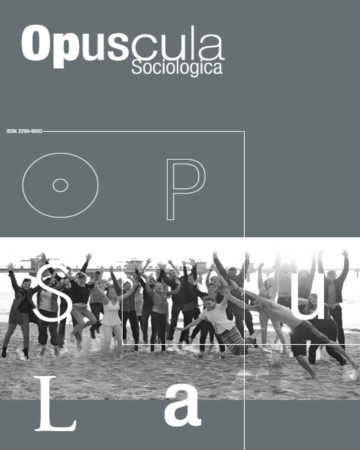
ISSN: 2299-9000
eISSN: 2353-2882
OAI
DOI: 10.18276/os.2017.1-03


Issue archive /
nr 1/2017
Trauma dezintegracji i integracji w wymiarze lokalnym na przykładzie powojennego powiatu ełckiego
(The Trauma of Disintegration and Integration at the Local Level on the Example of the Postwar Ełk County)
| Authors: |
Stefan M.
Marcinkiewicz
Uniwersytet Warmińsko-Mazurski w Olsztynie |
| Keywords: | cultural trauma disintegration integration local identity |
| Data publikacji całości: | 2017 |
| Page range: | 13 (33-45) |
Abstract
The theory of cultural trauma, popularised in Poland by Piotr Sztompka, is suitable for the analysis of social processes which took place in the so-called Recovered Territories after the Second World War. Before the Second World War, most of Masuria belonged to the East Prussia in the Third Reich and was inhabited by Masurians and Germans. After the collapse of Nazi Germany, Masuria became a part of Poland. Most of the Masurians and Germans have escaped or been killed at the end of the war. Masuria was settled mainly by Poles. Cultural trauma is a cultural process mediated through various forms of representation, linking the reformation of collective identity and the reworking of collective memory (Ron Eyerman). In this case, the cultural trauma was associated with the processes of social disintegration and integration. The forced and voluntary migration led to the disintegration of the existing territorial social structures and the creation of new communities. The postwar processes of disintegration and integration are presented on the example of the town Ełk and Ełk county in Masuria. For this purpose, literature, archival materials and biographical interviews conducted in the Ełk county were employed. One of the main conclusions of the study suggests that there is a correlation between cultural trauma and the weak local identity in Masuria.
Download file
Article file
Bibliography
| 1. | Alexander, J.C., Eyerman, R., Giesen, B., Smelser, N.J, Sztompka, P. (2004). Cultural Trauma and Collective Identity. Oakland: University of California Press. |
| 2. | APS, O. Ełk, PUR. Sprawozdania miesięczne z działalności oddziału 1946, sygn. 116/1. |
| 3. | Archiwum Państwowe w Suwałkach Oddział Ełk (APS O. Ełk), Starostwo Powiatowe Ełckie. |
| 4. | Boharewicz-Richter, A. (1999). Korzenie. Suwałki: Wydawnictwo Z.J. Filipkowski. |
| 5. | Karkowska, M. (2014). Pamięć kulturowa mieszkańców Olsztyna lat 1945–2006 w perspektywie koncepcji Aleidy i Jana Assmannów. Warszawa: Wydawnictwo Instytutu Filozofi i Socjologii PAN. |
| 6. | Kawecki, J., Roman, B. (1970). Ełk. Z dziejów miasta i powiatu. Olsztyn: Wydawnictwo Pojezierze. |
| 7. | Król, J. (2010). Historia pomocy – Rodzina Dobkowskich. Polscy sprawiedliwi. POLIN, Muzeum Historii Żydów Polskich. Pobrano z: https://sprawiedliwi.org.pl/pl/historie-pomocy/historia-pomocy-rodzina-dobkowskich (28.12.2016). |
| 8. | Marcinkiewicz, S. (2015). Mityczna stolica Mazur. Między Ełkiem a Lyck, Ełk: Muzeum Historyczne w Ełku. |
| 9. | Przegiętka, M. (2008). Rywalizacja na pograniczu. Prusy Wschodnie i sąsiednie polskie powiaty województw białostockiego i warszawskiego w drugiej połowie lat trzydziestych XX wieku. Komunikaty Mazursko-Warmińskie, 4, 125–136. |
| 10. | Referat Budowlany. Sprawy grobownictwa wojennego 1949, sygn. 130/111. |
| 11. | Sakson, A. (1998). Stosunki narodowościowe na Warmii i Mazurach 1945–1997. Poznań: Wydawnictwo Instytutu Zachodniego. |
| 12. | Sakson, A. (2004). Migracje w XX wieku. W: M. Salamon, J. Strzelczyk (red.) Wędrówka i etnogeneza w starożytności i średniowieczu (s. 441–456). Kraków: Historia Iagellonica.45 |
| 13. | Schieder, Th. (1955). Deutsche Bevölkerung aus den Gebieten Östlich der Oder-Neisse, BI/2. Wolfenbüttel: Grenzland-Druckerei Rock & Co. |
| 14. | Sztompka, P. (2007). Socjologia. Analiza społeczeństwa. Kraków: Wydawnictwo Znak. |
| 15. | Tryczyk, M. (2015). Miasta śmierci. Sąsiedzkie pogromy Żydów. Warszawa: Wydawnictwo RM. |
| 16. | Zaremba, M. (2012). Wielka trwoga. Polska 1944–1947. Ludowa reakcja na kryzys. Kraków: Wydawnictwo Znak, Instytut Studiów Politycznych PAN. |
| 17. | Zaremba, M. (2016a). Krajobraz po wojnie. Pomocnik Historyczny Polityki, 4. |
| 18. | Zaremba, M. (2016b). Niepewność jutra. Pomocnik Historyczny Polityki, 4. |